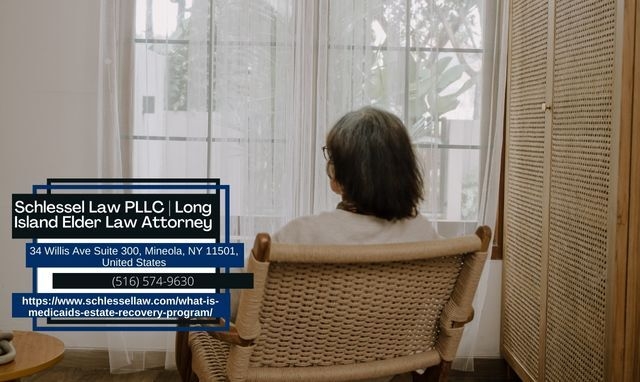Medicaid estate recovery can pose a significant risk to the financial legacy of individuals who rely on long-term care benefits. In a recent article titled “What is Medicaid’s Estate Recovery Program?”, Long Island Medicaid planning attorney Seth Schlessel (https://www.schlessellaw.com/what-is-medicaids-estate-recovery-program/) provides a clear explanation of how Medicaid may seek to reclaim funds after a recipient's death. The article, published by Schlessel Law PLLC, discusses the rules and limitations of the estate recovery process in New York and emphasizes the importance of early planning to preserve assets.
According to Long Island Medicaid planning attorney Seth Schlessel, estate recovery allows the state to recover costs for medical services rendered to Medicaid recipients aged 55 and older, or those who have been permanently institutionalized. This may involve claims against assets such as homes, bank accounts, or investments. “Although Medicaid covers medical expenses, states have the option to recoup their payments by selling off your assets after death,” Schlessel notes in the article.
For families navigating long-term care decisions, the involvement of a Long Island Medicaid planning attorney like Seth Schlessel can be instrumental in developing strategies that reduce exposure to estate recovery. The article explains that while Medicaid cannot seize assets during a recipient’s lifetime, once the individual passes away, the estate, including real estate and financial accounts, may be subject to recovery unless specific exemptions apply.
A core issue raised in the article is the misconception that certain assets, such as a primary residence, are protected. Schlessel explains that while the home may not count as an asset during the Medicaid eligibility assessment, it can still be targeted after death unless certain family members reside there. Exceptions include a surviving spouse, a child under 21, or a disabled child. Additionally, adult children or siblings who lived in the home and provided care before the recipient entered a nursing facility may also qualify for exemptions.
The article also points to a major legislative change that reshaped the scope of Medicaid’s estate recovery. As detailed by Long Island Medicaid planning attorney Seth Schlessel, the New York 2012-2013 budget bill repealed earlier provisions that had expanded the definition of recoverable assets. The repeal now limits Medicaid’s recovery efforts to probate assets—those that are solely in the deceased’s name and not passed directly to a beneficiary. This provides a more defined boundary for families, as jointly-owned assets and certain trust-held assets are excluded from the recovery process.
Seth Schlessel warns that timing is crucial. New York Medicaid rules include a five-year look-back period, meaning that asset transfers or trust creations must occur well before an application is submitted. Medicaid planning strategies, such as irrevocable trusts or life estates, must be implemented early to be effective. “Certain estate planning measures can protect some portions of your estate from the Medicaid clawback,” he states, emphasizing the need for forward-thinking legal counsel.
The article also discusses the Medicaid clawback, a process through which the state attempts to reclaim costs posthumously. Assets often targeted include home equity, investments, and personal savings. Schlessel outlines several legal tools available to mitigate this risk, such as Medicaid Asset Protection Trusts (MAPTs), which can shield eligible assets if established well in advance of applying for Medicaid.
For individuals and families who want to protect their property and savings, Schlessel advises creating a long-term care plan that incorporates Medicaid eligibility and estate preservation. The presence of a Long Island Medicaid planning attorney can provide clarity on available options and help navigate Medicaid’s stringent financial criteria. This is especially important in regions like Long Island, where property values are high and the risk of asset loss due to estate recovery is more pronounced.
The article concludes by underscoring that Medicaid planning is not only about qualifying for benefits but also about securing what has been earned and intended for future generations. The need for proactive planning and legal oversight cannot be overstated.
Understanding the risks associated with Medicaid estate recovery and taking early action can make the difference between leaving a meaningful inheritance or facing the loss of hard-earned assets. Schlessel Law PLLC, led by Long Island Medicaid planning attorney Seth Schlessel, offers guidance to those seeking to build a secure long-term care plan.
For those concerned about protecting their home, savings, or family’s financial well-being, scheduling a consultation with Seth Schlessel is an important first step in avoiding the consequences of unplanned Medicaid estate recovery.
About Schlessel Law PLLC:
Schlessel Law PLLC is a New York-based law firm offering legal services related to elder law, Medicaid planning, and estate planning. The firm is committed to helping clients make informed decisions about long-term care and asset protection.
Embeds:
Youtube Video: https://www.youtube.com/watch?v=VmQq7BoDZxI
GMB: https://www.google.com/maps?cid=7387587768064061142
Email and website
Email: seth@schlessellaw.com
Website: http://www.schlessellaw.com/
Media Contact
Company Name: Schlessel Law PLLC
Contact Person: Seth Schlessel
Email: Send Email
Phone: (516) 574-9630
Address:34 Willis Ave Suite 300
City: Mineola
State: New York 11501
Country: United States
Website: https://www.schlessellaw.com/




